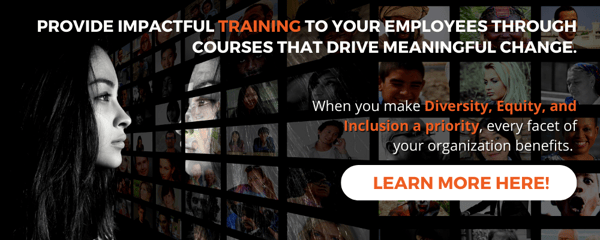Creating an inclusive and supportive workplace environment is crucial for the well-being and productivity of all employees. However, LGBTQ+ and more (Lesbian, Gay, Bisexual, Transgender, and Queer or Questioning) individuals often face unique challenges and barriers in the workplace that can negatively impact their professional and personal lives.
“Over 40% of LGBTQ+ workers (45.5%) reported experiencing unfair treatment at work, including being fired, not hired, or harassed because of their sexual orientation or gender identity at some point in their lives.”
~ UCLA School of Law, Williams Institute
Challenges Faced by LGBTQ+ Employees
While progress has been made on LGBTQ+ issues over the years, employees continue to confront a range of unique challenges. Workplace discrimination, harassment, and exclusion persist, casting a shadow over the experiences of lesbian, gay, bisexual, transgender, and queer individuals.
The struggle for acceptance and equal treatment can result in feelings of invisibility, fear, and vulnerability, impeding their ability to fully express their identities and perform to their highest potential. It is crucial to acknowledge and address the hurdles that LGBTQ+ employees still encounter on their journey toward workplace inclusivity and acceptance.
Discrimination and Prejudice
Discrimination and prejudice can manifest in various forms, including biases in hiring practices, lack of promotion opportunities, or hostile work environments where derogatory language or offensive jokes are prevalent. These discriminatory behaviors affect not only LGBTQ+ employees' job satisfaction but also their mental health and overall well-being.
Harassment and Bullying
LGBTQ+ employees are more likely to experience workplace harassment and bullying compared to their heterosexual and cisgender counterparts. This can lead to increased stress, anxiety, and fear, making it difficult for individuals to thrive in their professional roles. Such negative experiences can also contribute to higher rates of turnover and absenteeism among LGBTQ+ employees.
Lack of Support
Many LGBTQ+ employees feel a lack of support from their colleagues and superiors. The absence of visible role models or mentors who share similar identities can make it challenging for LGBTQ+ individuals to feel a sense of belonging and inclusion within the workplace. This lack of support can hinder their professional growth and development.
Heteronormative Polices and Practices
Traditional workplace policies and practices often assume a heteronormative perspective, disregarding the unique needs and experiences of LGBTQ+ individuals. For instance, family leave policies may not consider same-sex partnerships or transgender employees' needs for gender-affirming healthcare. These gaps in policy can create additional stress and discomfort for LGBTQ+ employees.

Encouraging Inclusivity in the Workplace
Organizations can take steps to encourage inclusivity and minimize the challenges faced by LGBTQ+ employees.
- Develop and Implement Comprehensive Non-Discrimination Policies - Employers should establish clear and robust non-discrimination policies that explicitly include sexual orientation, gender identity, and gender expression. These policies should be communicated to all employees and enforced consistently to ensure a safe and inclusive work environment.
- Provide Diversity and Inclusion Training - Conduct regular diversity and inclusion training sessions to educate employees about LGBTQ+ issues, cultural competency, and unconscious bias. These training courses can help foster empathy, understanding, and respect among employees, creating a more inclusive workplace.
- Offer Benefits and Policies that Support LGBTQ+ Employees - Employers should review their policies to ensure they are inclusive of LGBTQ+ individuals. This may include offering comprehensive healthcare benefits that cover gender-affirming procedures and mental health support. Additionally, updating family leave policies to be inclusive of same-sex partnerships and adopting gender-neutral restroom facilities can demonstrate a commitment to LGBTQ+ inclusivity.
- Foster and Inclusive Culture - Employers should actively promote an inclusive culture by celebrating diversity and creating opportunities for LGBTQ+ employees to contribute and thrive. This can involve showcasing LGBTQ+ role models, recognizing LGBTQ history and milestones, and actively including LGBTQ perspectives in decision-making processes.
Benefits of LGBTQ+ Employee Resource Groups
LGBTQ+ employee resource groups or affinity networks can provide a welcome platform for employees to connect, share experiences, and offer support. Resource groups can also serve as a valuable resource for employers to receive feedback and suggestions on creating a more inclusive workplace.
By providing support through an ERG, employers are sending a message that they care about the well-being of their diverse workforce and understand the unique challenges faced by LGBTQ+ individuals in the workplace.
An ERG also serves as a way to recruit and retain top talent from this community. Studies have found that many potential job seekers look for companies with policies promoting diversity and inclusion before deciding which employer to work with. An LGBTQ+ employee resource group is one way for companies to demonstrate to prospective candidates that they are committed to creating an equitable working environment for all their employees.
They can be a great way for employers to create visibility around their commitment to diversity and inclusion. By publicly recognizing the work of the ERG or providing space on social media channels for members to share their stories, companies are showing that they’re open to learning about the experiences of LGBTQ+ employees. This is a powerful message that can help build trust between employers and this community.
Having an LGBTQ+ Employee Resource Group allows employers to stay up to date on important issues facing the LGBTQ+ community, such as discrimination in the workplace or changing laws regarding sexual orientation or gender identity. In this way, ERGs provide an invaluable resource for employers who want to ensure they are providing a safe and equitable workplace for all their employees.
Legal Issues and Pitfalls
While creating an inclusive workplace is crucial, employers should be aware of potential legal issues and pitfalls. It is essential to consult legal experts to ensure compliance with local and federal laws concerning LGBTQ+ rights.
5 concerns and challenges:
-
Equal Employment opportunity (eeo) Laws- employers should familiarize themselves with EEO laws, such as Title VII of the Civil Rights Act, which prohibits discrimination based on sex, including sexual orientation and gender identity. It is important to ensure that all policies and practices are in line with these laws to avoid potential legal consequences.
-
privacy & confidentiality- respecting the privacy and confidentiality of LGBTQ+ employees is crucial. Employers should handle sensitive information, such as an employee's sexual orientation or gender identity, with care and only share it when necessary and with appropriate consent. Maintaining confidentiality helps build trust and ensures a safe environment for LGBTQ employees.
-
Avoid tokenism- it is essential to avoid tokenism, which is the practice of including a few LGBTQ+ individuals solely for appearance without valuing their perspectives or experiences. Tokenism can create an uncomfortable and isolating environment for LGBTQ+ employees and undermine genuine inclusivity efforts. Instead, focus on creating an authentic and equitable workplace culture.
-
harassment and retaliation- employers must have clear policies and procedures in place to address harassment and retaliation against LGBTQ+ employees. This includes promptly investigating and taking appropriate action against any reported incidents. Establishing a zero-tolerance policy for harassment sends a strong message that discriminatory behavior will not be tolerated.
-
Employer training and education- while training is essential, it is crucial to ensure that it does not perpetuate stereotypes or biases. Training programs should be developed in collaboration with diversity and inclusion experts, focusing on promoting understanding, empathy, and cultural competence. Regularly evaluate the effectiveness of training programs to address any unintended biases or shortcomings.
An Inclusive Workplace Benefits All
When all employees feel valued, respected, and able to bring their authentic selves to work, it creates a positive and supportive atmosphere that encourages collaboration, creativity, and innovation.
An inclusive workplace benefits the entire organization by fostering a supportive and thriving work environment that brings out the best in everyone.
When you partner with Ulliance, our Life Advisor Consultants are always just a phone call away to teach ways to enhance your work/life balance and increase your happiness. The Ulliance Life Advisor Employee Assistance Program can help employees and employers come closer to a state of total well-being.
Investing in the right EAP or Wellness Program to support your employees will help them and help you. Visit https://ulliance.com/ or call 866-648-8326.
The Ulliance Employee Assistance Program can address the
following issues:
• Stress about work or job performance
• Crisis in the workplace
• Conflict resolution at work or in one’s personal life
• Marital or relationship problems
• Child or elder care concerns
• Financial worries
• Mental health problems
• Alcohol/substance abuse
• Grief
• Interpersonal conflicts
• AND MORE!
Have some questions about our services? Book a quick meeting below!
References:
American Psychological Association. (2021). Sexual Orientation and Gender Identity. Retrieved from:
https://www.apa.org/topics/lgbtq
Human Rights Campaign. (n.d.). Workplace Equality Resources. Retrieved from
https://www.hrc.org/resources/workplace
LGBT People’s Experiences of Workplace Discrimination and Harassment, UCLA School of Law, Williams Institute
https://williamsinstitute.law.ucla.edu/publications/lgbt-workplace-discrimination
Ensuring Workplace Inclusion for LGBTQ Employees, Society for Human Resources Management https://www.shrm.org/resourcesandtools/tools-and-samples/toolkits/pages/lgbtq_inclusion.aspx
What Job Seekers Really Think About Your Diversity and Inclusion Stats, Glassdoor https://www.glassdoor.com/employers/blog/diversity/

